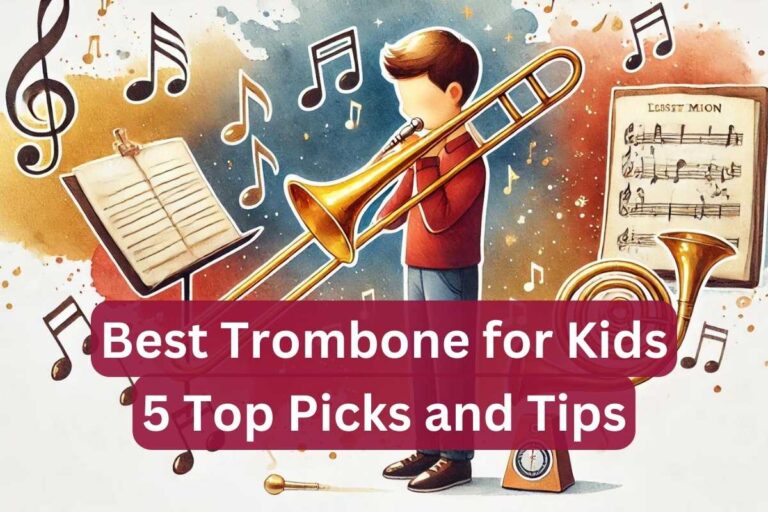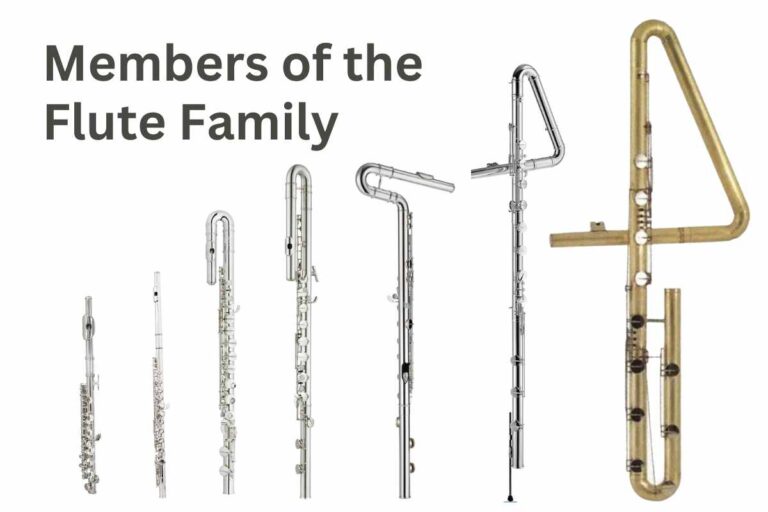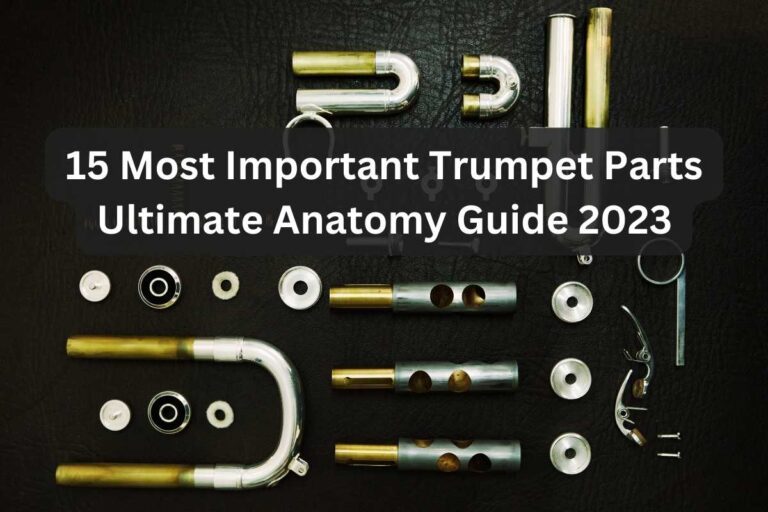Best 11 Resources For Trombone Lessons — Read Before Start Learning
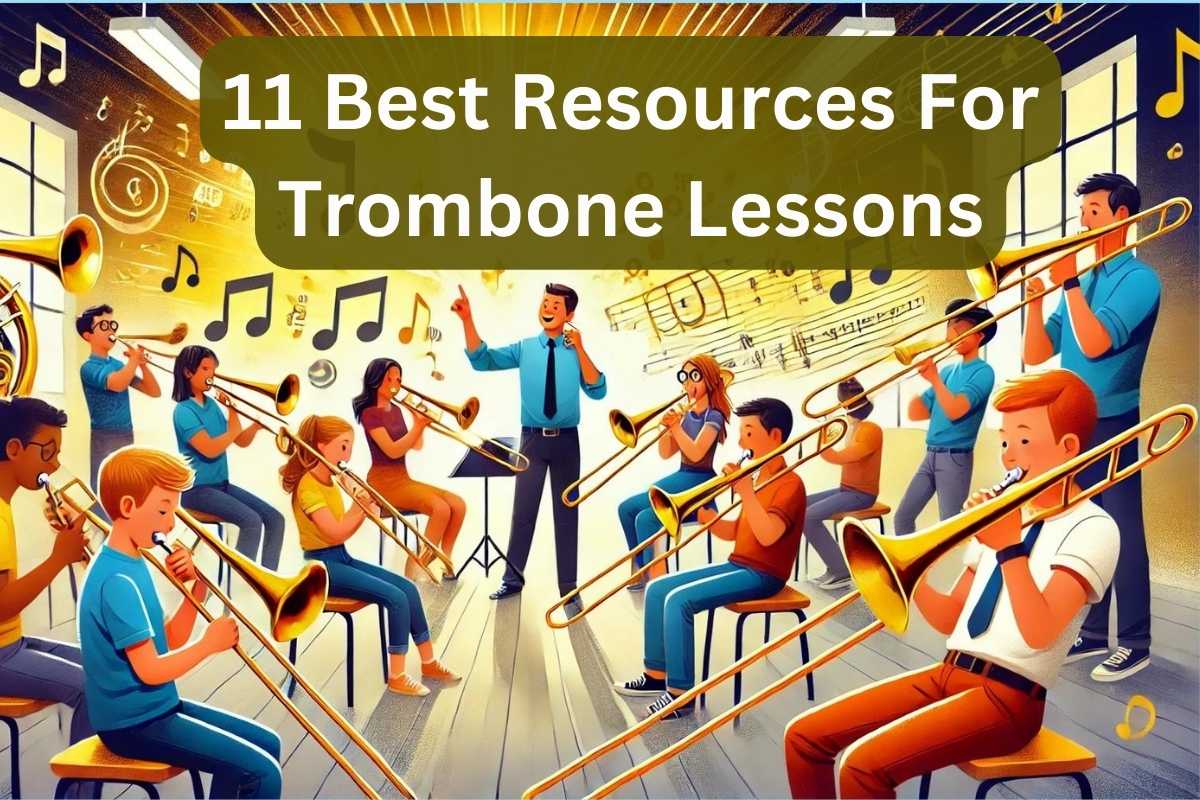
My goal is to explore the best 11 resources for trombone lessons to start my musical expedition. This includes a variety of options such as online video tutorials and private in-person sessions to accommodate my preferred style of learning.
The discussion revolves around the advantages of learning under a tutor, various learning methodologies, the process of identifying the most suitable trombone instructor, common errors to evade, techniques to maintain motivation, and essential components to seek in a high-quality trombone lesson.
Whether I am at a beginner’s level or aiming to enhance my existing skills, I am assured that this article encompasses all the necessary information required prior to embarking on trombone lessons.
1. Online Video Lessons
I find that online video lessons for learning the trombone offer a convenient and adaptable method for both beginners and experienced musicians to enhance their skills. These lessons encompass a variety of comprehensive video tutorials that cover essential techniques and valuable tips.
You can access these video lessons on popular platforms such as YouTube, Udemy, and Skillshare, where a diverse range of content is available, spanning from fundamental basics to advanced strategies. Beginners can take advantage of lessons that concentrate on proper embouchure and slide positions, while more experienced players can delve into intricate techniques like double tonguing and multiphonics. These online resources often feature esteemed trombonists sharing their expertise and offering personalized insights, serving as a valuable tool for musicians seeking to elevate their musical capabilities.
(Read my other post to “Master The Chromatic Scale On Trombone”)
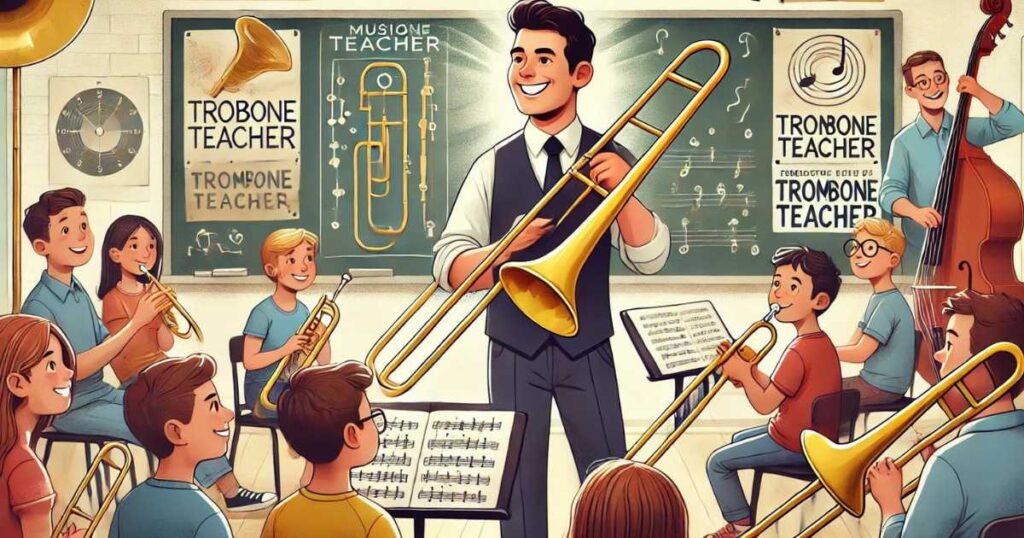
2. Private In-Person Lessons
I love private in-person trombone lessons that provide personalized instruction delivered by a seasoned teacher. These lessons concentrate on practice techniques, embouchure development, and effective breathing exercises.
The individualized approach in one-on-one settings allows teachers to effectively address the student’s unique strengths and areas for improvement. Immediate feedback during these private lessons ensures that any issues are promptly corrected, leading to quicker progress and skill advancement.
Through hands-on guidance, students refine their technique, enhance their tone quality, and cultivate confidence in playing the trombone. The personalized nature of these lessons allows students to establish specific goals and work towards achieving them within a supportive and focused environment.
[Ready to start but don’t own a horn yet? Read my post about “How Much Does A trombone Cost”]
3. Online Tutoring Services
Engaging with online tutoring services for the trombone offers a convenient avenue for receiving tailored instruction and monitoring progress effectively. Experienced teachers deliver targeted practice techniques and feedback to enhance the learning experience.
The framework of online tutoring typically comprises personalized one-on-one sessions with seasoned instructors, allowing students to schedule lessons at their convenience. These sessions cover a wide range of topics including technique enhancement, music theory, and solo repertoire. Platforms like Zoom, Skype, and Google Meet are frequently utilized for these virtual lessons, establishing a seamless connection between student and teacher.
The advantages of progress tracking in online tutoring enable students to gauge their development over time, while the provision of personalized feedback from instructors aids in addressing specific areas needing improvement.
4. Online Forums and Communities
Engaging in online forums and communities is a valuable opportunity for trombone players like myself to exchange tips, resources, and practice routines, creating a supportive environment conducive to learning and growth.
Participating in online communities focused on trombone playing not only facilitates connections with fellow enthusiasts but also grants access to a wealth of knowledge and expertise. These forums and social media groups enable players to seek peer advice, share insights on technique, explore new musical pieces, and even collaborate on various projects. By actively involving myself in these communities, I can expand my musical horizons, glean valuable lessons from others’ experiences, and experience a sense of camaraderie within a specialized yet dynamic online milieu.
5. Instructional Books and Sheet Music
As a trombone player, I understand the importance of utilizing instructional books and sheet music as essential tools for enhancing musical proficiency. These resources offer structured guidance on music theory and practice schedules, contributing to a comprehensive learning experience.
For beginners, instructional books serve as a solid foundation by introducing basic techniques and simple melodies, gradually progressing to more complex pieces as proficiency increases. Intermediate-level players can benefit from instructional books that focus on skill refinement, mastering challenging techniques, and expanding musical repertoire. Advanced players often seek specialized instructional books that delve into advanced music theory, orchestration, and improvisation techniques to further elevate their musical expertise.
Along with instructional books, sheet music plays a crucial role in the translation of musical notation into sound. It aids in the development of interpretative skills and fosters a deeper understanding of musical compositions, serving as a valuable tool for musicians at all skill levels.
6. Video Tutorials and Demonstrations
Video tutorials and demonstrations serve as invaluable tools for trombone players like myself, offering visual and auditory examples to enhance my understanding of articulation, tone production, and slide technique.
These tutorials cater to a broad spectrum of skill levels, accommodating beginners in search of foundational knowledge as well as seasoned players seeking advanced techniques and insights. Beginners can benefit from basic tutorials focusing on essential skills like embouchure formation, proper breathing techniques, and fundamental fingerings.
On the other hand, experienced players can leverage tutorials that explore nuanced aspects of articulation, variations in tone color, and advanced slide techniques such as lip slurs and multiphonics, providing avenues for them to refine their performance.
By integrating these tutorials into my practice regimen, I can elevate my overall playing proficiency and musical expression.
7. Online Trombone Lessons Platforms
The landscape of music education has been transformed by online platforms that offer trombone lessons, providing easily accessible video tutorials tailored to different skill levels and learning preferences.
These platforms often enlist seasoned instructors who lead students through well-structured courses, covering fundamental techniques, music theory, and performance skills. Students have access to a plethora of lesson resources, including sheet music, practice exercises, and play-along tracks.
Furthermore, many platforms incorporate interactive elements such as live Q&A sessions, virtual masterclasses, and student forums, fostering a sense of community among learners.
By seamlessly blending convenience with top-notch instruction, these platforms create a nurturing environment for trombone enthusiasts to enhance their skills and achieve their musical aspirations.
8. College or University Music Programs
In college and university music programs, I am immersed in a comprehensive trombone education that covers performance, recitals, and music history, aiming to shape me into a well-rounded musician. Enrolling in these programs grants me access to professional instructors who provide guidance on technique, interpretation, and musical expression. The structured curriculum ensures a progressive learning journey that encompasses mastering diverse musical genres and styles.
Participating in performance opportunities like ensemble collaborations, solo recitals, and concerts allows me to refine my skills in front of live audiences, gaining valuable stage experience. Exploring music history helps me develop a profound understanding of the evolution of music, enriching my appreciation and interpretation of musical compositions.
9. Music Stores and Instrument Shops
Music stores and instrument shops play a crucial role for trombone players like myself, offering a variety of instruments, maintenance tips, and resources that contribute to a deeper appreciation of music.
Whether I am a novice seeking my first trombone or an experienced player requiring repair services, these establishments cater to a broad spectrum of musicians’ needs. From the sale of trumpets and saxophones to the expert rehairing of violin bows, these stores boast a wide selection of premium instruments and accessories. They are instrumental in imparting valuable maintenance advice and guidance to ensure that instruments receive proper care, ultimately extending their lifespan and preserving their optimal sound quality.
10. Local Community Music Groups and Bands
Engaging in local community music groups and bands presents trombone players with valuable opportunities for participating in ensemble playing and group performances, cultivating a sense of community and collaborative musicianship.
These musical groups offer a nurturing atmosphere where players can both teach and learn from their peers, contributing to their growth as musicians. Regular interactions with fellow musicians aid in refining playing techniques, enhancing timing, and elevating musical expression.
Membership in a community music group also provides a platform for consistent performances, enabling trombone players to display their abilities and develop confidence in front of an audience. Through the ensemble experience, individuals can cultivate teamwork and communication skills, fostering a deeper comprehension of music and a heightened appreciation for collaborative artistry.
11. Professional Trombone Players and Teachers
Drawing knowledge from professional trombone players and instructors has been instrumental in enhancing my understanding of advanced tips, techniques, and performance strategies that are essential for elevating my trombone playing to a professional caliber.
Their extensive experience has been invaluable in helping me, as an aspiring musician, cultivate a refined sense of phrasing, articulation, and tone control, all of which are fundamental aspects of trombone performance. Through their mentorship, I have been able to deepen my comprehension of musical interpretation and expression, refining my ability to emote through my playing.
Additionally, mentors have provided insightful guidance on aspects such as stage presence, ensemble dynamics, and effective practice regimens, all of which contribute significantly to a comprehensive and polished trombone performance.
The mentorship process has not only facilitated my growth and discipline but has also nurtured creativity, enableing me to realize my full musical potential.
What Are the Benefits of Learning Trombone with a Teacher?
Engaging in trombone lessons with a teacher provides a multitude of advantages, such as receiving personalized instruction, tailored techniques, and consistent progress tracking to facilitate effective and structured learning.
When partnering with a teacher, learners benefit from immediate feedback on their performance, enabling them to rectify errors promptly and enhance their skills efficiently. Moreover, teachers can devise customized lesson plans that align with the unique needs and objectives of each student, ensuring a learning experience that is both stimulating and productive.
Through close collaboration with a teacher, students can monitor their advancement over time, establish milestones, and receive direction on areas that necessitate improvement, fostering continual growth and enhancement in their musical proficiencies.
What Are the Different Learning Styles and Which One Is Best for Trombone Lessons?
In my experience, I have found that various learning styles, including visual, auditory, and kinesthetic, can play a significant role in how effectively one learns to play the trombone. Each style brings its own set of advantages to the table when it comes to music education and practice routines.
Visual learners may find utilizing sheet music or instructional videos to be beneficial in enhancing their grasp of music theory and notation. On the other hand, auditory learners may thrive by listening to recordings or attending live performances to hone their ear for tone and phrasing.
As a kinesthetic learner myself, I have discovered that engaging in tactile exercises such as air blowing exercises or physical demonstrations of proper embouchure techniques can be particularly effective in reinforcing muscle memory and coordination for trombone playing. These hands-on approaches have proven to be invaluable in my music education and practice sessions.
How Can One Find the Best Trombone Teacher for Their Needs?
In the pursuit of finding the optimal trombone instructor, I meticulously consider various factors such as teaching methods, experience, and how well they align with my learning objectives.
When on the quest for an appropriate mentor, it is imperative to assess their credentials, encompassing both their educational background and professional journey. I seek out educators who boast a robust history in trombone instruction and a demonstrated ability to foster meaningful connections with students. Evaluating their instructional techniques against my preferred learning style is a crucial step in this process.
Engaging in trial lessons affords me the opportunity to directly experience their teaching approach, facilitating a thorough evaluation of its compatibility with my learning preferences. Moreover, seeking recommendations from fellow musicians or esteemed music educators can offer valuable insights into the instructor’s standing and efficacy within the realm of music education.
What Are the Common Mistakes to Avoid When Learning Trombone?
In mastering the trombone, it is important to steer clear of common mistakes such as neglecting proper practice techniques, maintaining poor posture, and following inconsistent practice schedules. A fundamental aspect to bear in mind is the necessity of establishing a solid foundation in the basics of trombone playing to ensure enduring success.
Many beginners tend to rush through exercises without paying attention to correct technique, which can lead to the formation of detrimental habits that may prove challenging to rectify in the future.
Emphasizing quality over quantity during practice sessions is crucial, as is maintaining proper posture to avoid strain or injury. Consistency plays a vital role in skill development, thus setting up a regular practice routine, even if brief each day, can result in notable progress over time.
How Can One Stay Motivated and Consistent in Their Trombone Practice?
Maintaining motivation and consistency in my trombone practice regimen demands the establishment of a structured practice schedule, monitoring progress meticulously, and establishing realistic goals. By delineating my objectives into short-term and long-term targets, I can construct a clear pathway for advancement.
Recognizing and commemorating small triumphs in my journey, such as successfully mastering a challenging passage or flawlessly hitting a high note, can cultivate a gratifying sense of achievement.
Introducing diversity into my practice routines, whether through the exploration of new exercises or the experimentation with varied musical genres, can infuse my sessions with vitality and enjoyment.
Diligently monitoring my progress not only enables me to acknowledge my development but also serves as a source of motivation to pursue ongoing enhancement.
What Are the Key Elements to Look for in a Good Trombone Lesson?
In my experience, a high-quality trombone lesson encompasses essential components such as providing clear guidance on techniques, incorporating music theory concepts, and implementing structured practice schedules that are tailored to the individual student’s proficiency level.
The effectiveness of trombone instruction hinges on the emphasis placed on cultivating proper breathing techniques, mastering embouchure control, and refining slide movements to elevate the quality of sound production and articulation. Moreover, students must acquire a solid understanding of fundamental music theory principles, including scales, intervals, and chord progressions, to enrich their comprehension of music composition and interpretation.
Furthermore, the integration of personalized practice regimens is paramount in reinforcing these foundational skills, enabling students to make consistent progress and foster self-assurance in their musical capabilities.
Frequently Asked Questions
1. What are the best 11 resources for trombone lessons?
The best 11 resources for trombone lessons are:
1. Private lessons with a professional trombonist
2. Online courses and tutorials
3. Trombone method books
4. Sheet music and exercises
5. Video lessons from renowned trombonists
6. Online forums and communities for trombone players
7. Music software and apps for practice and learning
8. Trombone ensembles and group classes
9. Workshops and masterclasses
10. YouTube channels dedicated to trombone lessons
11. Online or in-person workshops and classes with renowned trombone teachers.
2. Should I only rely on one resource for trombone lessons?
No, it is recommended to use a variety of resources for trombone lessons, such as private lessons, method books, and online tutorials. This can help you gain a well-rounded understanding and skillset in playing the trombone.
3. Is it necessary to take private lessons with a professional trombonist?
While it is not necessary, private lessons with a professional trombonist can greatly benefit your learning experience. They can provide personalized instruction and feedback, as well as share their expertise and experience as a professional musician.
4. Can I learn to play the trombone solely through online resources?
While online resources can be a valuable tool for learning the trombone, it is recommended to also have some in-person instruction, whether it be through private lessons or group classes. This allows for a more interactive and personalized learning experience.
5. Are there any resources specifically for beginners learning the trombone?
Yes, there are many resources specifically designed for beginners learning the trombone, such as beginner method books, online tutorials, and beginner-friendly sheet music. It is important to start with these resources to build a strong foundation in trombone playing.


